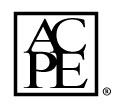
Pharmacy Technicians are approved to participate in two (2) CE activities: (1) Utilizing a Pharmacy Professional Development Practitioner to Create a Robust Onboarding Experience and Drive Retention (0.50 CE credit) and (2) Medication Safety Pearls (1.0 CE credit). If you are a pharmacy technician, please do not register on this page, Instead, register for the pharmacy technician approved CE activities by clicking here>>>.
Fee
CE Hours
Activity Type
- Knowledge
Target Audience(s)
- Pharmacists
Accreditation(s)

|
St. Louis College of Pharmacy at the University of Health Sciences and Pharmacy in St. Louis is accredited by the Accreditation Council for Pharmacy Education as a provider of continuing pharmacy education. To learn more about the specific program information, including universal activity numbers (UAN's) and learning objectives, please expand the modules below. Following successful completion of an evaluation, CE credit will be automatically reported to NABP through the CPE Monitor system, using the NABP ePID numbers and date of birth (MMDD) stored in participants' user profiles. Follow this link to learn more about CPE Monitor and the credit reporting process » Participants are responsible for ensuring receipt of credit; no credit can be corrected or awarded if more than 60 days have passed from the date of the event or if the home study is expired.
It is the policy of St. Louis College of Pharmacy at the University of Health Sciences and Pharmacy in St. Louis, to ensure balance, independence, objectivity and scientific rigor in all its educational programs. All faculty participating in this program are expected to disclose to the program audience any real or apparent conflicts of interest related to the content of the presentation.
|
Joint Provider(s)
Requirements for CE Credit
- Create a Learning Express account (if you don't have one already).
- Register and pay with a valid account, including an accurate NABP e-Profile ID and date of birth (month and day).
- Attend all sessions.
- Complete the post-test and the online evaluation for each session attended (must be logged in to complete). Post-tests and evaluations are available until September 2, 2022 after which time they will close, and credit can no longer be claimed.
Speaker(s)/Author(s)
|
1. Paul Milligan, Pharm.D.
|
|
|
2. Sandra Tooley, Pharm.D.
|
|
|
3. Paul Milligan, Pharm.D.
|
|
|
4. Peter Kokkinias, Pharm.D.
|
|
|
5. Sue Lee-Chuu, Pharm.D., BCPS
|
Activity Number
0033-9999-21-078-H05-P
CE Hours
Objectives
- Describe medication errors and patient safety risks related to MAR hold
- Discuss informatics optimizations to prevent missed doses related to MAR holds and off the floor time
Speaker(s)/Author(s)
|
Baely DiRenzo, Pharm.D., BCPS
|
|
|
Christie Davis, Pharm.D., BCPS
|
|
|
Miranda Lynch, Pharm.D.
|
Activity Number
0033-9999-21-061-H05-P
CE Hours
Objectives
- Identify the main differences between multidisciplinary and interdiscplinary care
- Design an interdisciplinary cross training program
- List potential barriers to the success of the interdisciplinary cross training program
Speaker(s)/Author(s)
|
Mary Soliman Pharm.D., BCPS
|
Activity Number
0033-9999-21-030-H04-P
CE Hours
Objectives
- Create a SWOT analysis for a Pharmacist or Pharmacy Technician orientation and onboarding programs.
- State how a Pharmacy Professional Development Practitioner utilizes point trainers to drive consistent onboarding experiences.
- Explain why the Pharmacy Professional Development Practitioner creates a Transition to Practice Course to add stability in a new hire.
- Discuss how a Pharmacy Professional Development Practitioner Develops a mentorship program to support new hires well after orientation.
Speaker(s)/Author(s)
|
Lisa A. Purdy, Pharm.D.
|
Activity Number
0033-9999-21-028-H04-P
CE Hours
Objectives
- Identify clinical pearls that can be acted upon by pharmacists during an admissions review of a LTC reside
- Explain why admission medication review at time of discharge from a hospital to a LTC facility is important.
Speaker(s)/Author(s)
|
Cassie Sarnowsky, Pharm.D., BS
|
|
|
Mariah Hollabaugh, Pharm.D., MBA, BCPS
|
Activity Number
0033-9999-21-032-H05-P
CE Hours
Objectives
- Describe the challenges to developing a proactive drug diversion program
- Discuss the use of advanced analytics, machine learning, and artificial intelligence on a drug diversion program
- Discuss lessons learned during the implementation of a new drug diversion software solution
Speaker(s)/Author(s)
|
Amanda J. Hays, Pharm.D., MHA, BCPS, CPHQ, DPLA, F
|
|
|
Lacey Rodgers, Pharm.D, MHA, BSCSP
|
Activity Number
0033-9999-21-062-H04-P
CE Hours
Objectives
- Describe the pharmacists' role in the opioid crisis
- List educational points to provide providers on optimal prescribing of pain medications.
Speaker(s)/Author(s)
|
Amy M. Tiemeier, Pharm.D.,BCPS
|
Activity Number
0033-9999-21-031-H08-P
CE Hours
Objectives
- Describe why diluting IV push medications with a normal saline flush is not safe
- Discuss strategies for overcoming barriers to safe IV push practices
Speaker(s)/Author(s)
|
Baely DiRenzo, Pharm.D., BCPS
|
|
|
Miranda Lynch, Pharm.D.
|
|
|
Todd A. Walroth, Pharm.D., BCPS, BCCCP, FCCM
|
Activity Number
0033-9999-21-034-H04-P
